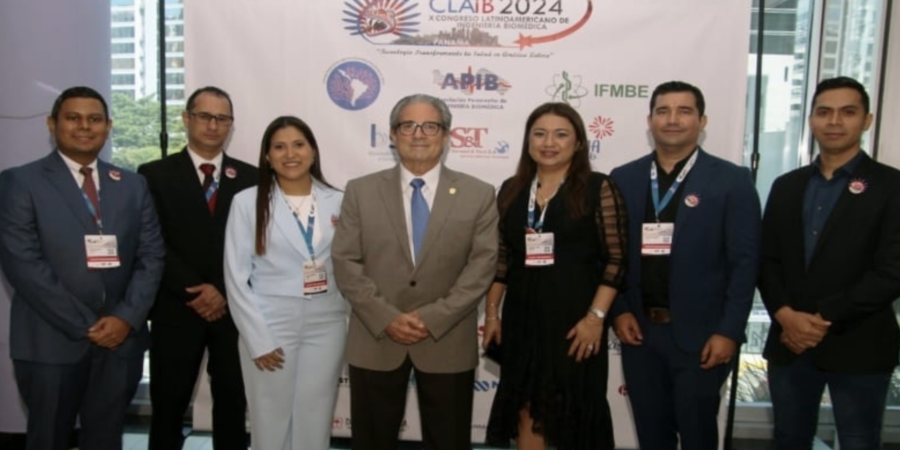Panamanian engineers specialized in Biomedicine showed the progress of that discipline in the country during a Latin American meeting that brought together experts in this field where that nation has more than 360 professionals graduated from local universities.
The guild recently held the Latin American Congress of Biomedical Engineering (CLAIB, edition X), presented projects developed in the areas of image processing, ethics and biomedical engineering, telemedicine, seizure detection systems and biosensors.
The Panama Section of the Institute of Electrical and Electronic Engineers (IEEE) was one of the organizations of the Congress; in addition, there is a collaboration agreement between IEEE-Panama and the Panamanian Association of Biomedical Engineering (APIB), an agreement that is oriented towards the advancement of that discipline taking into account that the IEEE EMB Chapter of that country also integrates the Latin American Council of Biomedical Engineering (CORAL).
Dr. Ernesto Ibarra, president of version X of the CLAIB, of the Panamanian Association of Biomedical Engineering (APIB) and elected president of the Panama Section of the Institute of Electrical and Electronic Engineers (IEEE-Panama), stressed that in recent years that specialty “has been gaining ground among the new generations, gradually consolidating for the benefit of the country’s health system.”
“Currently, Panama has 364 Biomedical Engineers graduated from national higher education centers, it is a number that grows more every day. In the group of conferences that the Panamanians presented in Congress, the great academic level that the nationals have was established,” Ibarra said.
According to Dr. Ibarra, the CLAIBs have become prestigious references to present results of scientific research, share experiences and coordinate actions between institutions and universities in the region to develop bioengineering, biomedical engineering and other related sciences.
The X CLAIB – which had a daily flow of 400 participants – contemplated scientific and professional activities such as pre-congress workshops, keynote lectures, technical tours, presentation of scientific research, and a commercial technical fair.
The opening ceremony of the X CLAIB had the participation of Eng. Luis Barriere, president of the Regional Council of Biomedical Engineering for Latin America (CORAL), who highlighted the Congress as the most important academic, scientific and professional platform of this specialty in Latin America.
“I congratulate the Panamanian Association of Biomedical Engineering for taking on the challenge of organizing the CLAIB, making Panama the first venue of the event in the Central American region and the Caribbean, after 26 years of existence,” Barriere said.
For his part, Dr. Leandro Pecchia, Secretary General of the International Federation for Medical and Biological Engineering (IFMBE), explained the importance of Latin America as a key region in the development of biomedical engineering and; in addition, he reiterated the support of the IFMBE to the activities aimed at the advancement of this discipline in the countries of the region.
Dr. Fernando Boyd Galindo, Minister of Health of Panama, highlighted the importance of biomedical engineering in the country and its role in the technological development of health; he also shared in general the government’s plans to turn that nation into a center of operations for medical devices, betting on job creation and the growth of this industry.
The organization of the Congress included a Commercial Technical Fair with the participation of 28 national and international medical equipment companies. In that space the companies showed various products and services related mainly to the medical and related devices industry.
Lic. Francisco Pinedo, Business Development Manager of PROMTUR Panama, highlighted the country as one of the “best options for congress and convention tourism as a key platform for innovation and advancement in biomedical engineering in Panama.”
Great connoisseurs
The Congress brought together 12 recognized international speakers; in addition, 86 scientific articles were presented, 5 of which were authored by Panamanian scientists, which constitutes almost 6 percent of the total.
All scientific articles accepted and defended during the X CLAIB will be published in SPRINGER, which is a highly recognized scientific, technical and medical portfolio in the world. These articles were selected by the CLAIB scientific committees from more than 200 articles submitted.
In addition, the X CLAIB was the framework for three other important events, which were: the II Latin American Conference of Clinical Engineering (CLIC), the II National Conference of Biomedical Engineering (CONAIB), and the I IFMBE Conference on Digital Health (CLASD). These events were held simultaneously within the X CLAIB, which is the flagship event of the Regional Council of Biomedical Engineering for Latin America (CORAL).
